Report of Seminar on Pakistan Poland Relations: Pursuing a Collaborative Future
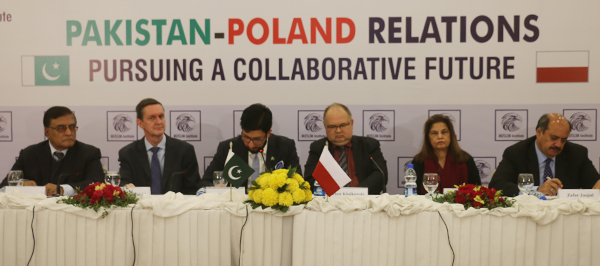
|
MUSLIM Institute organised a seminar titled “Pakistan Poland Relations: Pursuing a Collaborative Future” on Wednesday Feb 12, 2020, at Islamabad Club, Islamabad. Sahibzada Sultan Ahmed Ali (Chairman MUSLIM Institute) delivered the opening remarks. Mr. Usama Bin Ashraf (Research Associate, MUSLIM Institute) moderated the proceedings of the session. People from different walks of life also participated in the seminar.
|
Expert Panellists
| » |
His Excellency Mr. Piotr Opalinski
Ambassador of Poland to Pakistan |
| |
| » |
Sahibzada Sultan Ahmed Ali
Chairman, MUSLIM Institute |
| |
| » |
Prof. Dr. Piotr Klodkowski
Centre for Comparative Studies of Civilisations, Jagiellonian University, Cracow, Poland |
| |
| » |
Amb. Ms. Fouzia Nasreen
Former Ambassador of Pakistan |
| |
| » |
Prof. Dr. Zafar Nawaz Jaspal
School of Politics and International Relations Quaid-i-Azam University, Islamabad |
| |
| » |
Mr. Zafar Bakhtawari
Former President Islamabad Chamber of Commerce and Industry |
| |
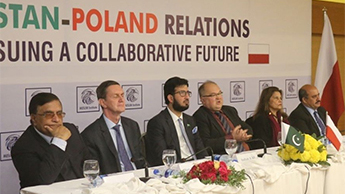
Stage view of the seminar.
|
|
|
|
A brief summary of the remarks shared by the speakers is observed as follows:
Pakistan and Poland have a long historical relationship. The diplomatic relations between both countries were formally established in 1962, with Pakistan being one of the first Muslim countries to establish relations with Poland. Historically, people of the two countries have ties going even back to 1940s, when during the Second World War, the city of Karachi hosted about 30,000 refugees from Poland. Polish pilots, aviation engineers, technicians stayed in Pakistan after World War II and were awarded honorary citizenship in 1956.
Both countries also have deep-rooted economic ties. Currently, Pakistan’s trade with Poland is estimated to be more than half-a-billion Euros. As a member of the European Union, Poland also supported Pakistan to secure the EU GSP Plus program. The fact that until the early 1990s, Polish flag vessels used to occupy around 30% of the berths at Karachi Port, is a testament to Pakistan-Poland trade cooperation which greatly facilitated the enhancement of trade to and from Pakistan. Furthermore, Polish Oil and Gas Company (PGNiG) is operating successfully in exploration and exploitation of the natural gas for the local network in Sindh. Interestingly, the identification chip in the personalized page of Pakistani passports has also been prepared by Poland. More recently, one of the Polish I.T Companies also contributed to the research on how to optimize cellular networks in Pakistan in view of the future plans on 5G.
|
|
|
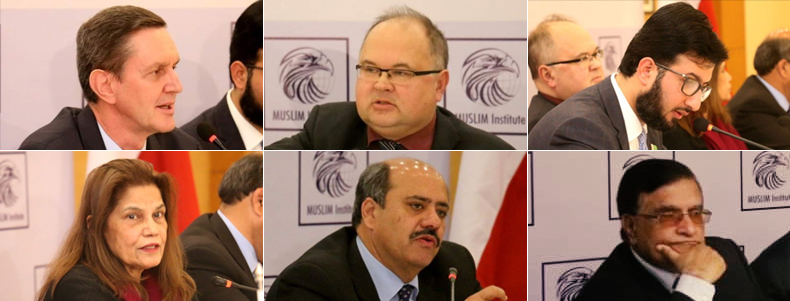
Row1 From left: Prof. Dr. Piotr Klodkowski, H.E Mr. Piotr Opalinski, Sahibzada Sultan Ahmad Ali
Row2 From left: Ms. Fouzia Nasreen, Prof. Dr. Zafar Nawaz Jaspal, Mr. Zafar Bakhtawari
|
|
Poland’s position in the heart of Europe has made it an important gateway to the European Continent. Pakistan’s business community can benefit from Poland’s unique location to get exposed to the European markets. Pakistan and Poland need to go for economic and trade links which are very important for the peace, prosperity and progress of both countries. Poland is an important country with a population of about 40 million and stands 4th largest country in Europe. Poland has a good population for businessmen to invest and to make some business ventures. Likewise, the Polish business community can take advantage of the improving business environment in Pakistan – especially given the planned development of Special Economic Zones under CPEC.
Indubitably, people-to-people contact and understanding about each other’s culture, customs and values are very important to improve bilateral ties. In that respect, it is a great pleasure that there is a Pakistan Chair at Jagiellonian University in Kraków, Poland. Polish scholars of Oriental and Inter-cultural Studies are also keeping a special focus on the works of Allam Muhammad Iqbal. Authors from both countries are now writing about this historic friendship. Pakistani students are of great value and worked as ambassadors of Pakistan when studying Poland. They played a great part in introducing cricket in Poland. To enhance co-operation, there should be direct airline between Pakistan and Poland which can generate a foundation of the relation in the field of economy, trade, social, political and cultural avenues.
|
|
|
Pakistan and Poland have been enjoying strong Defense Cooperation since the 1950s. In 1947, the British Air Force Command suggested Polish officers, pilots and technicians from the RAF (Royal Air Force) to serve in Pakistan Air Force. A team of thirty – 17 pilots and 13 technicians choose to join the Pakistan Air Force under the supervision of Squadron Leader Wladyslaw Josef Marian Turowicz who was a pilot and an engineer himself. They played a crucial role in defending the skies of Pakistan. The most notable among them was Turowicz, who set up technical institutes in Karachi, revitalized the Pakistan Air Force Academy, headed Space and Upper Atmosphere Research Commission (SUPARCO) and became Deputy Chief of Air Staff. Many officers and leaders of Pakistan air force were trained by Wladyslaw Josef Marian Turowicz. He participated in 1965 and 1970 war and also played a role in space program. He also contributed towards Nuclear program of Pakistan. He was awarded many prestigious awards such as Sitara-e-Pakistan, Sitara-i-Khidmat and others.
In the midst of changing geopolitical climate, there are many avenues of cooperation between Pakistan and Poland for securing peace and stability in our respective regions and the world at large. Agreement on Cooperation in the field of defence in 2018 between the two countries is certainly a positive step in this direction. Both countries have been working to maintain regional as well as international peace and stability. Poland not only acknowledges Pakistan’s efforts to establish peace in Afghanistan but also supports the peace process.
|
|
|
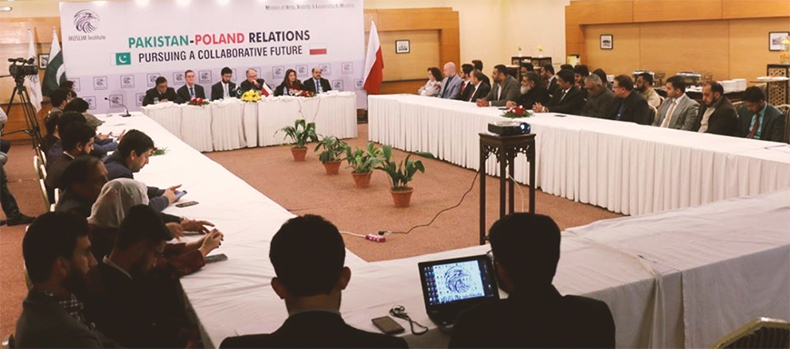
Hall view of the seminar.
|
|
Unfortunately, both countries have also been victims at times of appeasement policies by the international community. People of Poland suffered the aggression by the Nazis in the 1940s that arguably could have avoided, had the international community acted on time. Similarly, today Pakistan is facing the silence of the international community on the extremist and fascist aggression of the Modi regime especially in Kashmir. In order to achieve a peaceful resolution and end to this inhumane conflict, Pakistan looks towards the international community and hope that Kashmir can get the attention it deserves and, more importantly, needs.
|
|
|
In the context of national security, both countries have convergence in their policies and threat perceptions. In this changing world, both are encountering traditional as well as non-traditional challenges. In Pakistan’s national security, Pakistan not only has a traditional military challenge but also multiple non-traditional challenges. At the hypothetical level, both countries have a convergence of thinking that how they are looking at the things together. A second important area of the strategic convergence is that both countries are working for peace building in different regions. In this area, both countries can work together meanwhile strengthening bilateral relations.
|
|
|
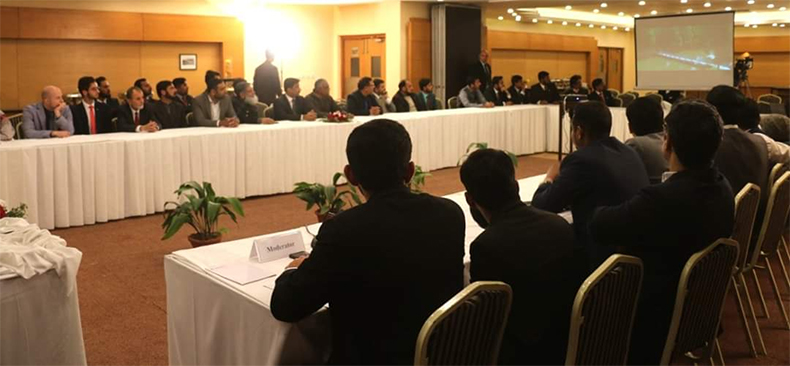
Hall view of the seminar.
|
|
The historic brotherly relationship between Pakistan and Poland will continue to thrive and will explore new vistas of cooperation. Moreover, both countries have to converge and learn from each other for handling non-traditional security challenges. Poland can also cooperate with Pakistan in people-oriented programmes. People to people links between Pakistan and Poland still have more potential to foster the relations and extend cooperation. Both the nation of the nation's looking into the future with hope, and we are sure that next generations, our youth will decide about this world and will bring development, cooperation and peace.
|
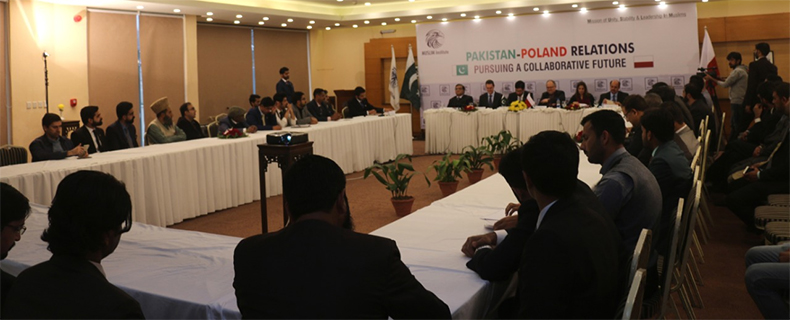
Hall view of the seminar.
|
| |
Download pdf
Newsletter
Share






